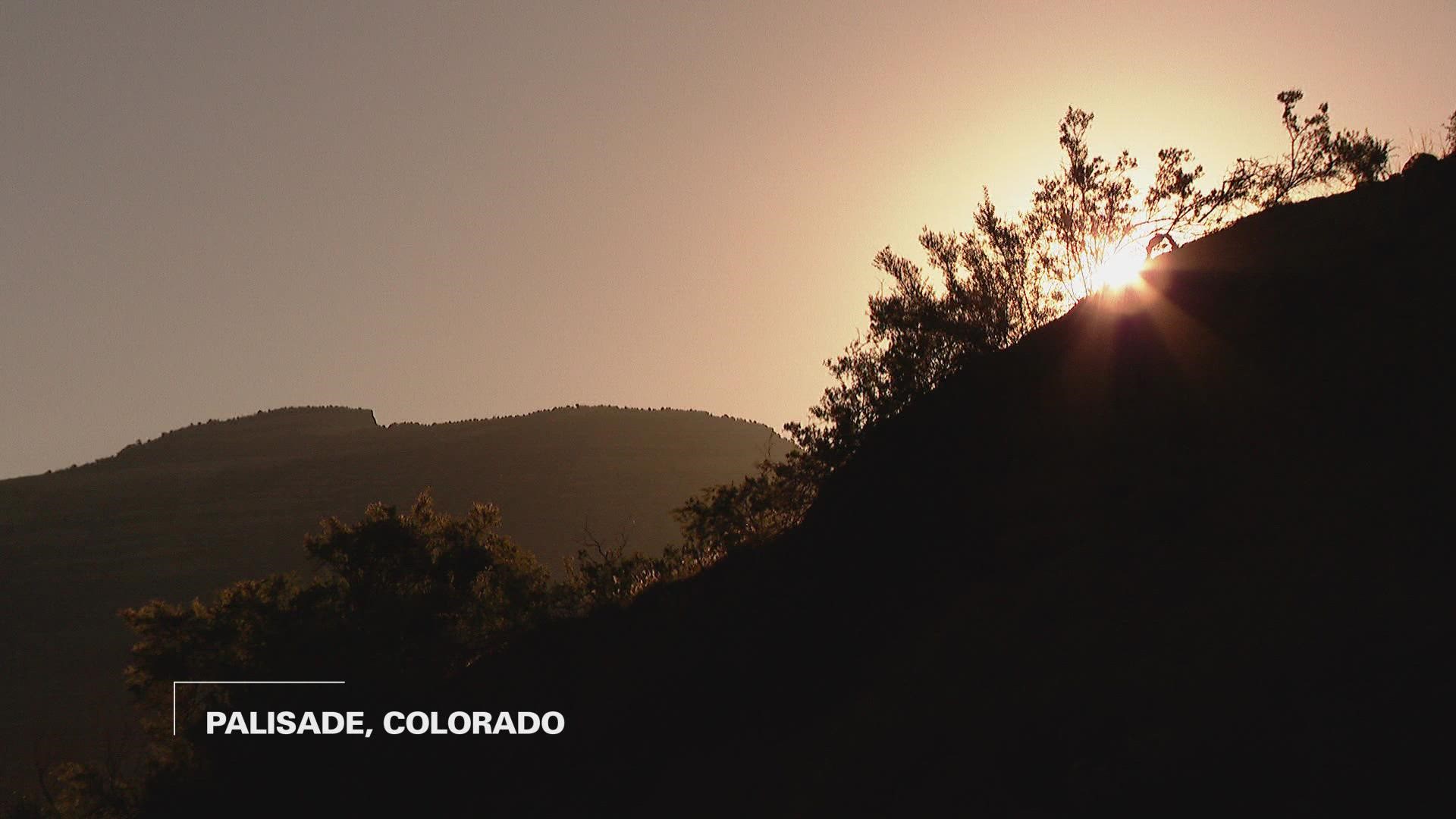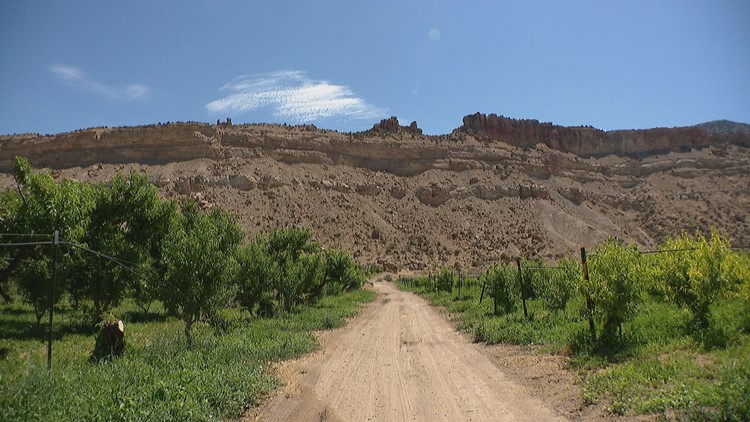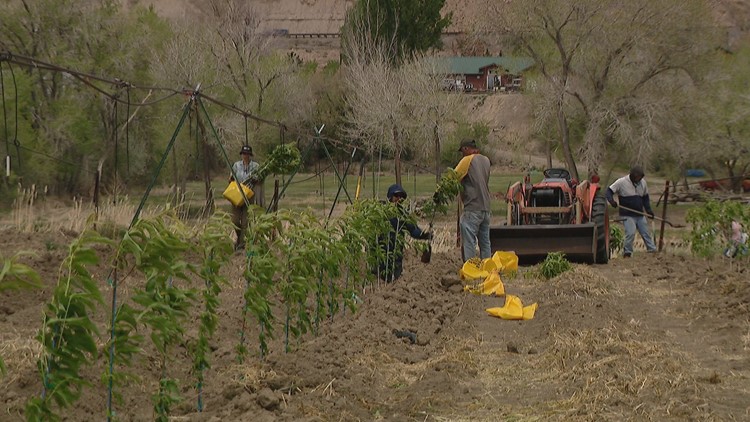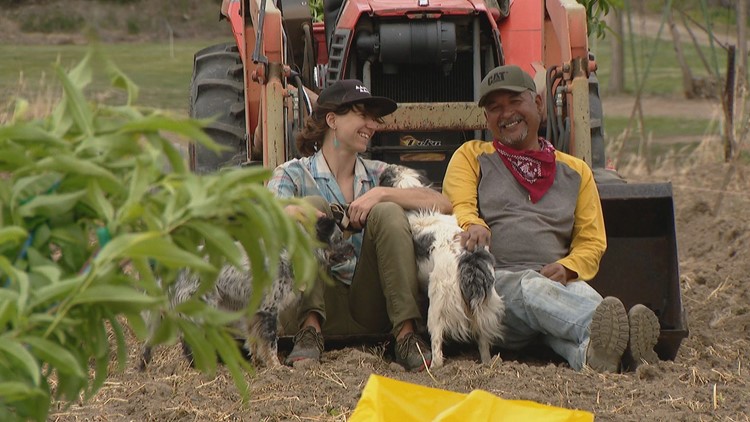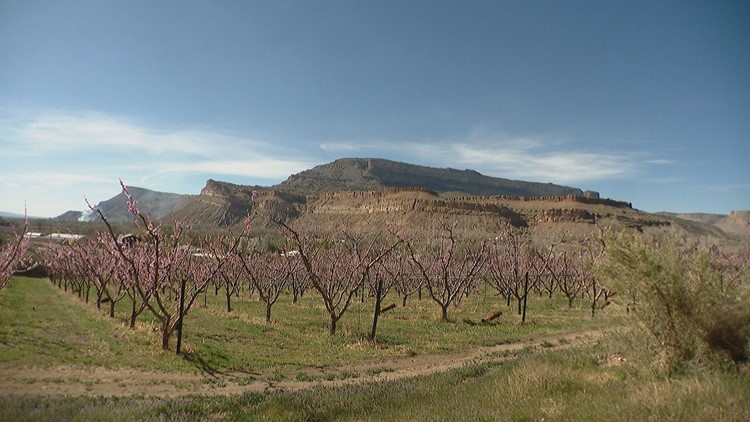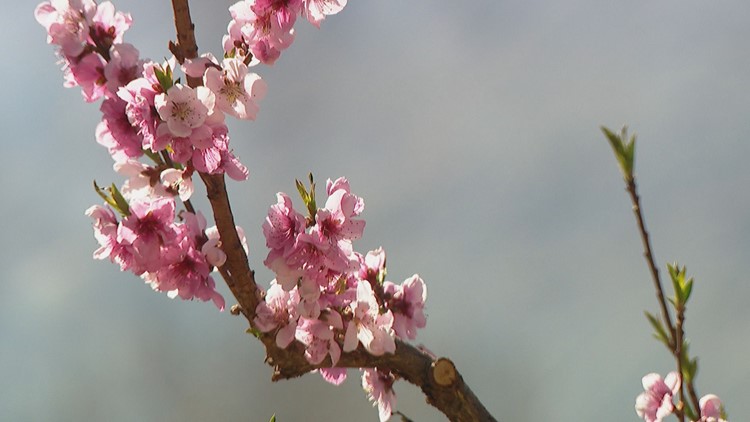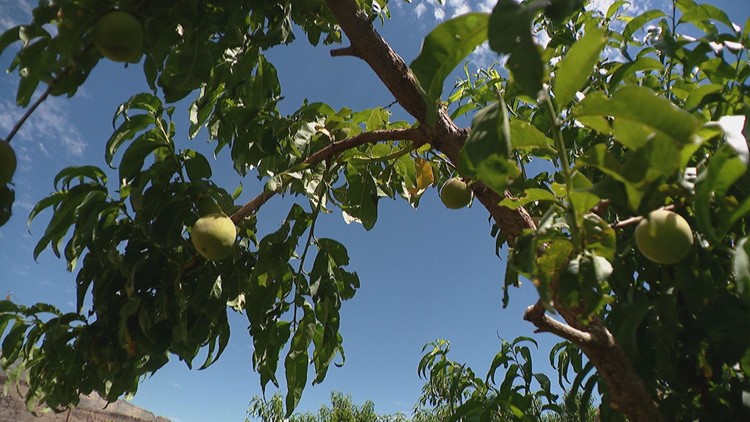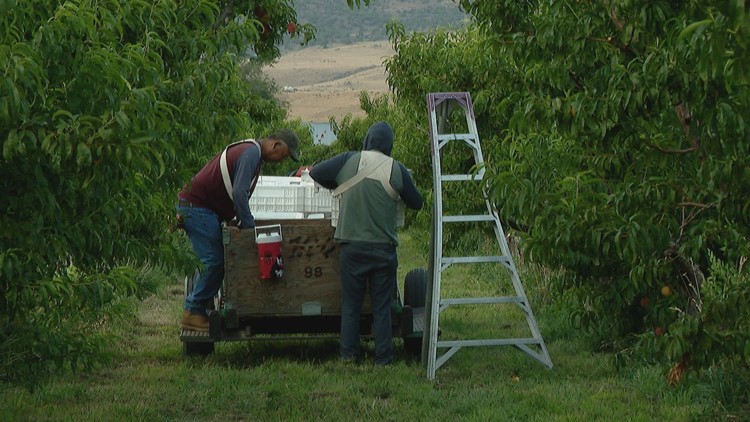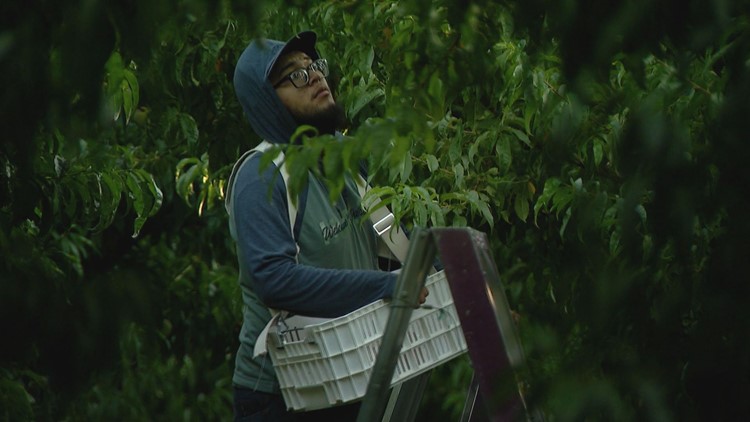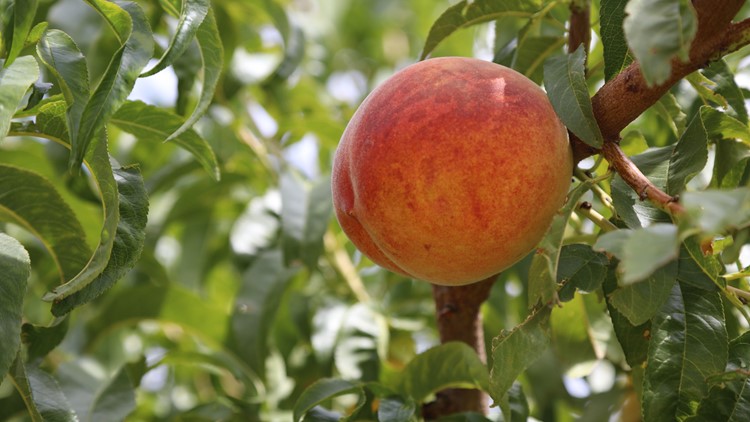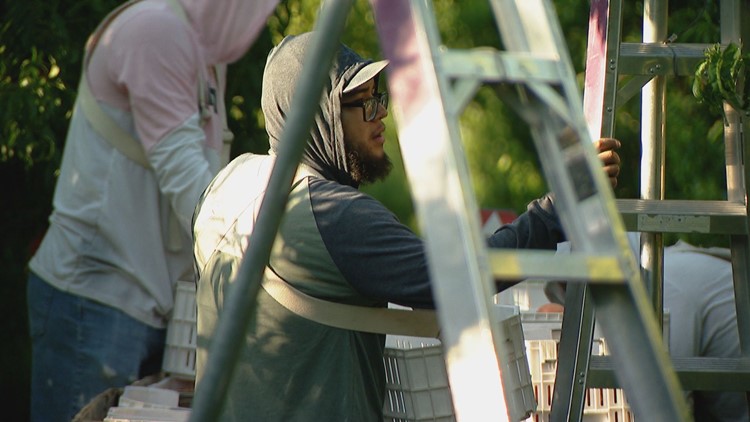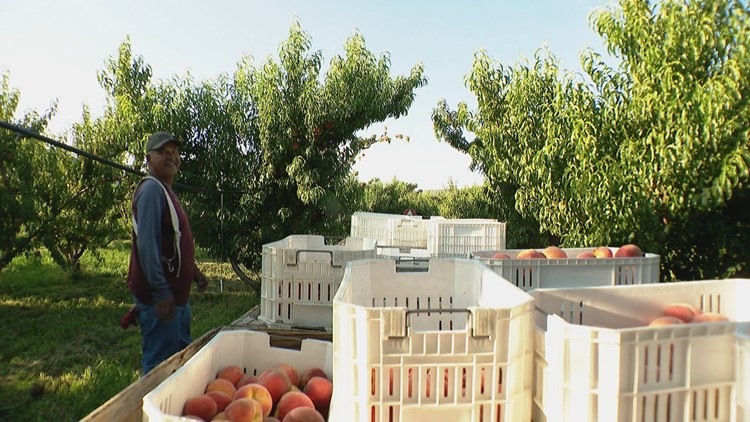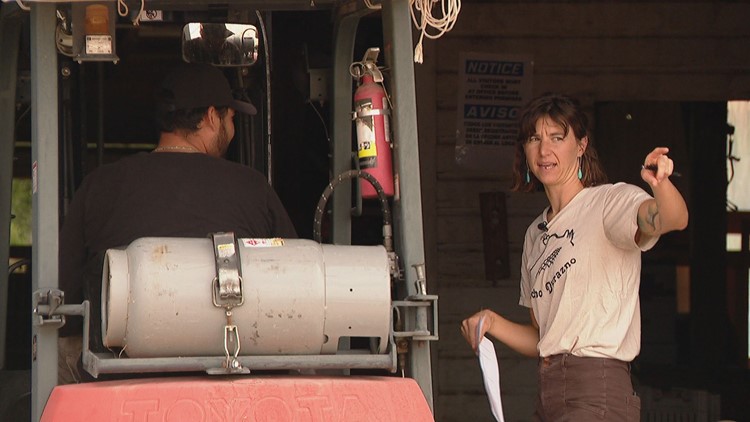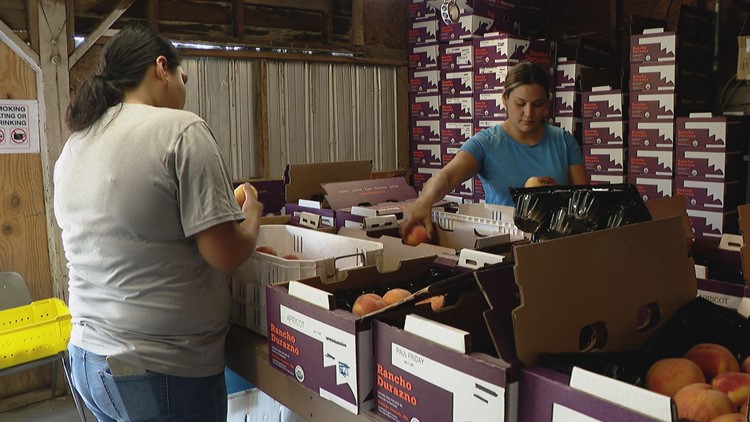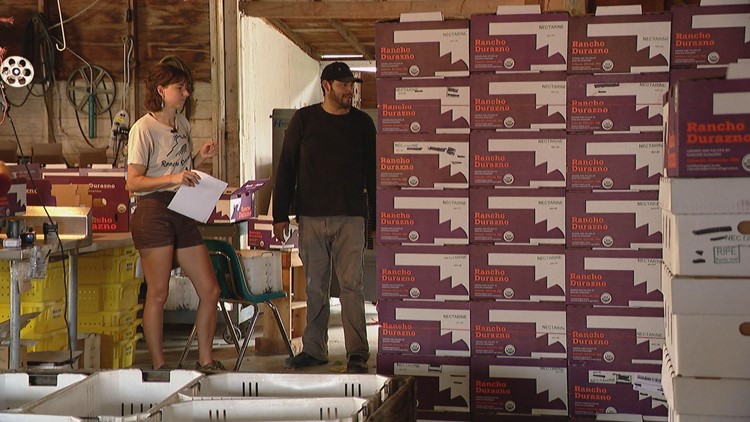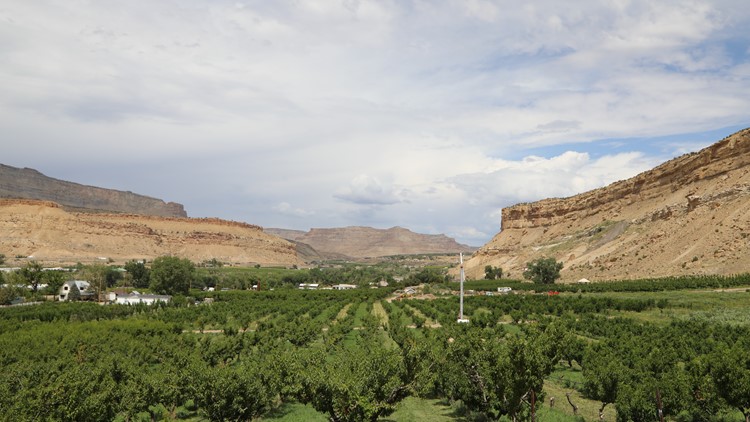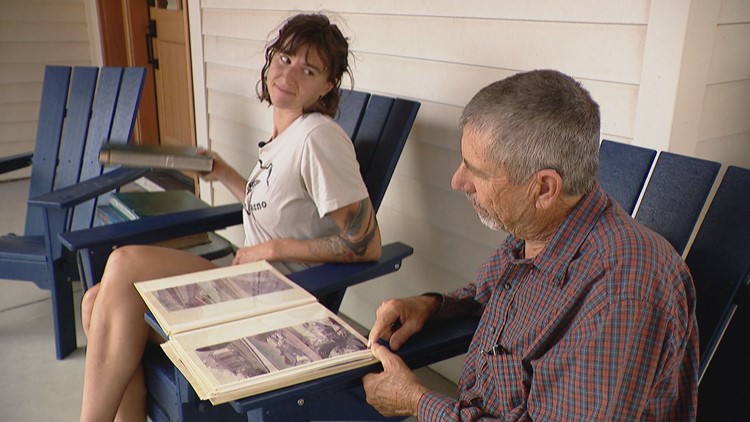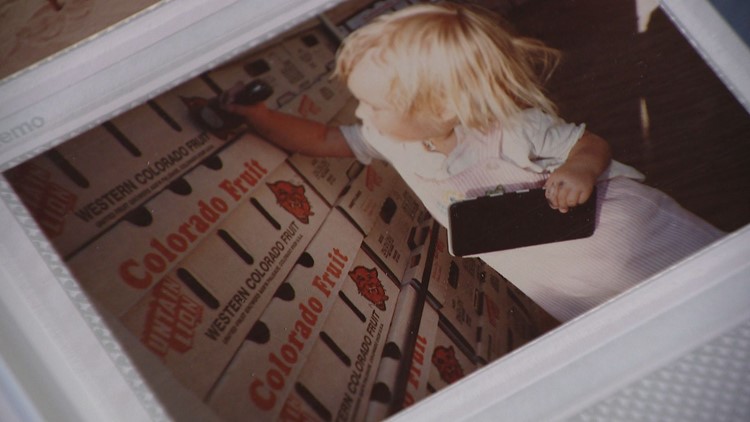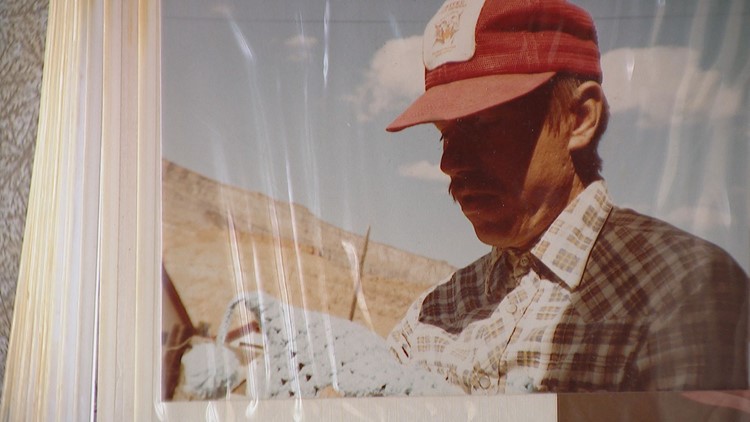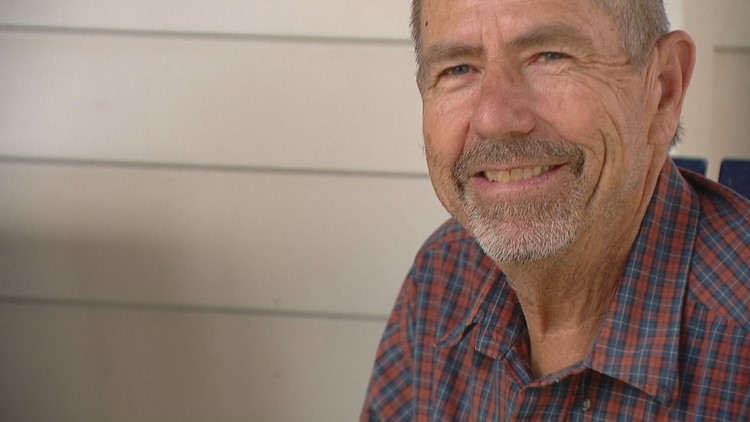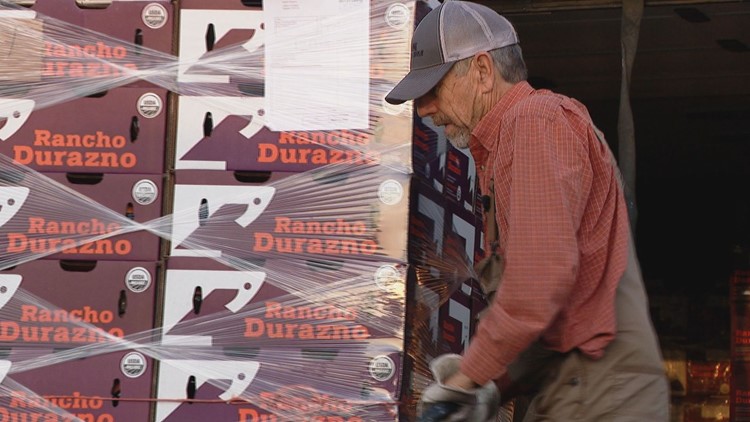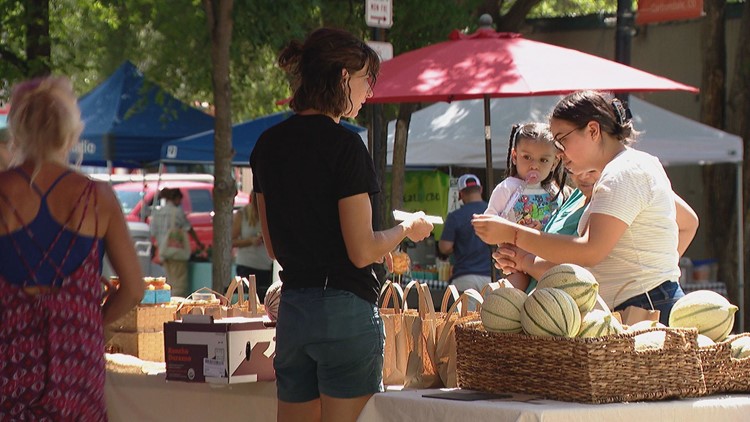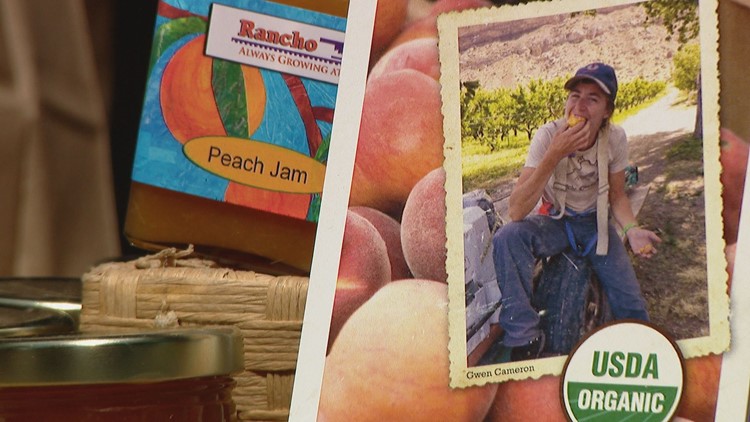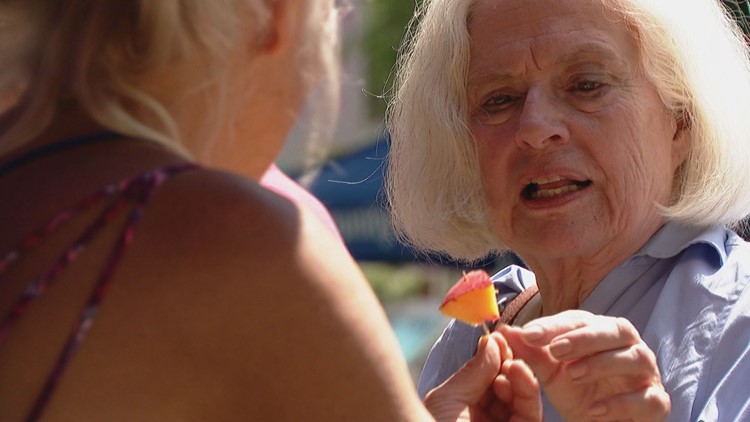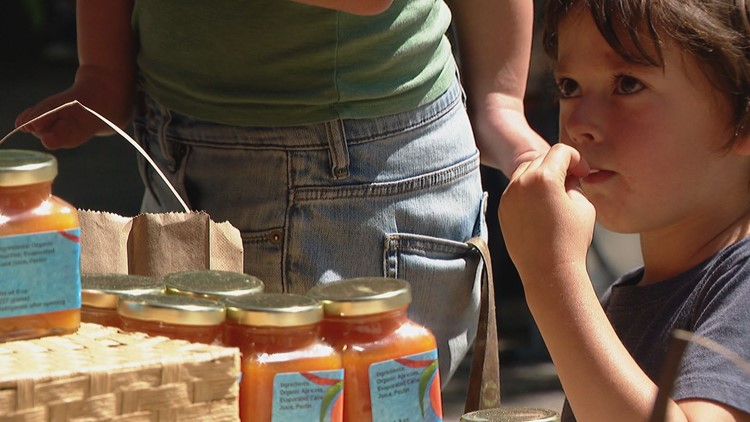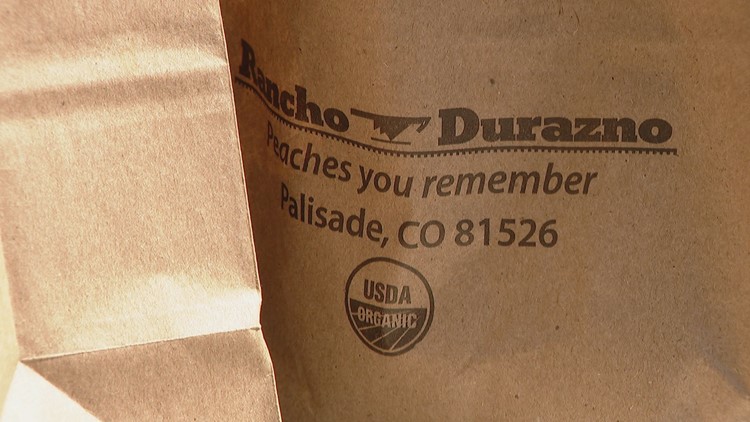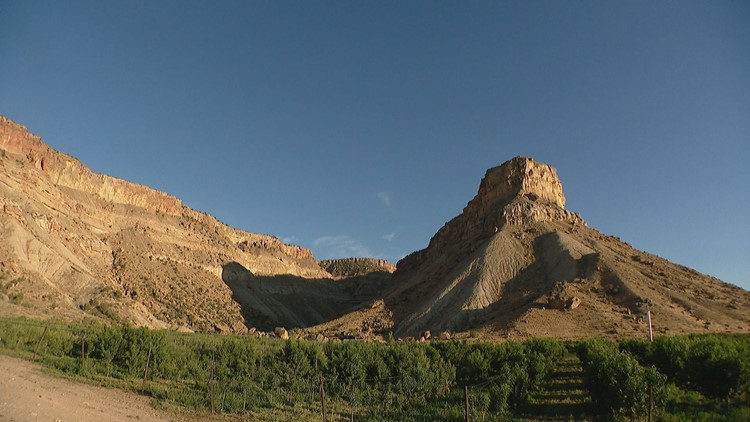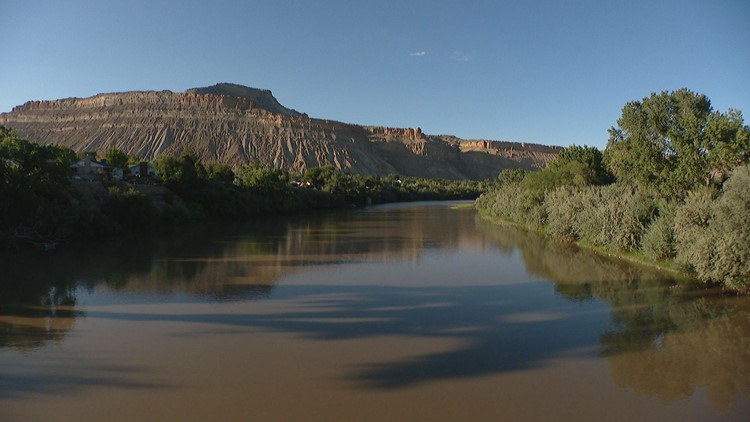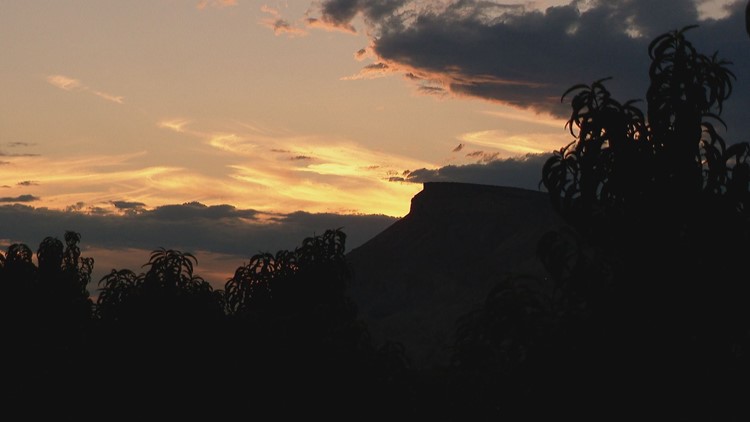'A pretty incredible gift': From blossom to market on a Palisade peach farm
Gwen Cameron, her father Thomas and their seasonal workers put in months of labor and passion into growing Colorado's iconic Palisade peaches.
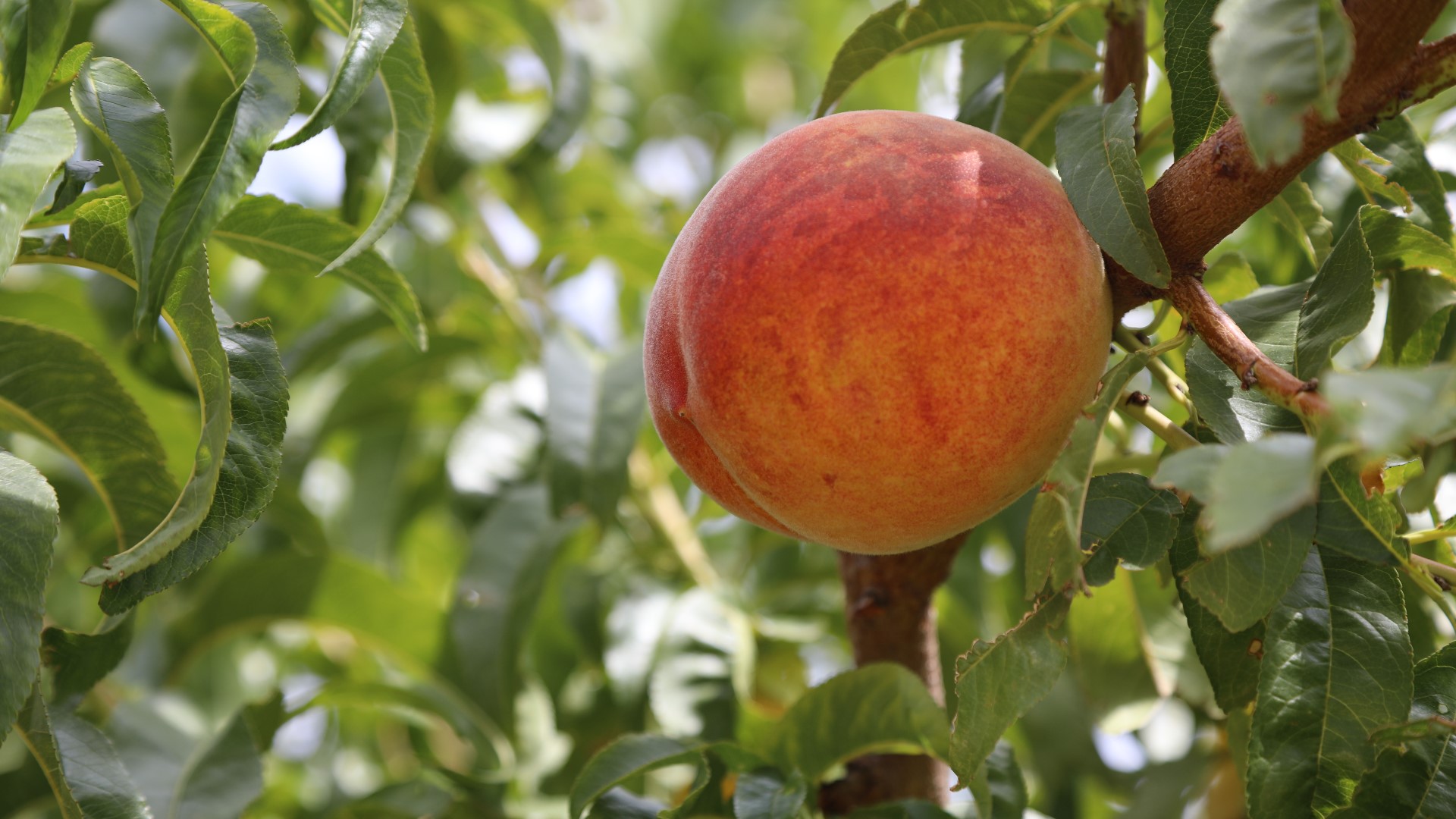
Chapter 1 A life's work
Each day on Colorado’s Western Slope starts with sunlight spreading over cliffs and mesas. Shadows and light play on the land in a magical way.
And as sure as the sun rises, the farmers wake up with it.
“I can see the whole history in these trees,” said Thomas Cameron, a longtime fruit farmer.
Like clockwork, Thomas has spent his last 50 springs rising early to survey his orchards in Palisade, known as Colorado’s wine country – and for its reddish, juicy peaches.
“I’m able to produce some experiences of a person’s lifetime,” Thomas said. “Sometimes the most flavorful experience someone’s had in life.”
Peach season starts in early April. Trees are full of pink and white blossoms and the buzz of pollinating bees. It’s peaceful and beautiful – a tourist’s cotton-candy colored dream as they bike along the backroads among farms and visit wineries.
It’s calm now, but looks can be deceiving.

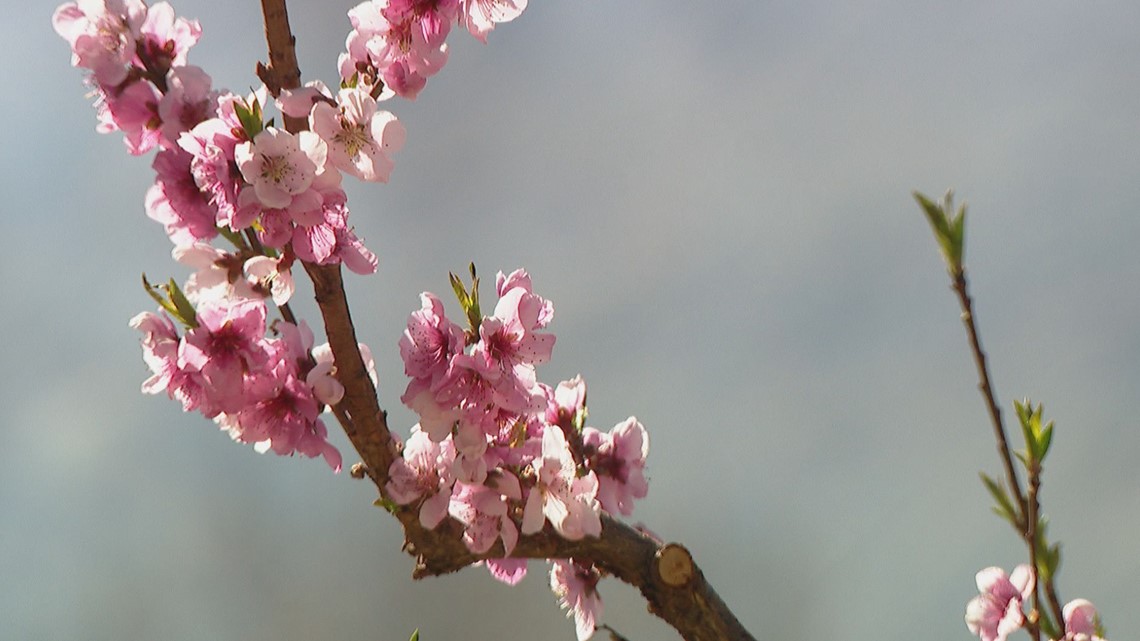
“I’ve learned that there is no time that disaster cannot strike,” Thomas said. He’s got a dry sense of humor, but he’s been smiling a lot lately.
It’s a little easier to grin now that he doesn’t have to worry about the frost that comes in spring, or the racoons that can ravage the orchards, or the hail that comes in the summer.
Retirement. That’s the season Thomas is settling into in spring 2022.
Thomas’ 40-acre farm, Rancho Durazno, has been his life’s work. He came to Palisade as a college-aged kid to pick peaches. Learned the job. Bought his own acreage. Made mistakes, had successes – and three daughters while he was at it.

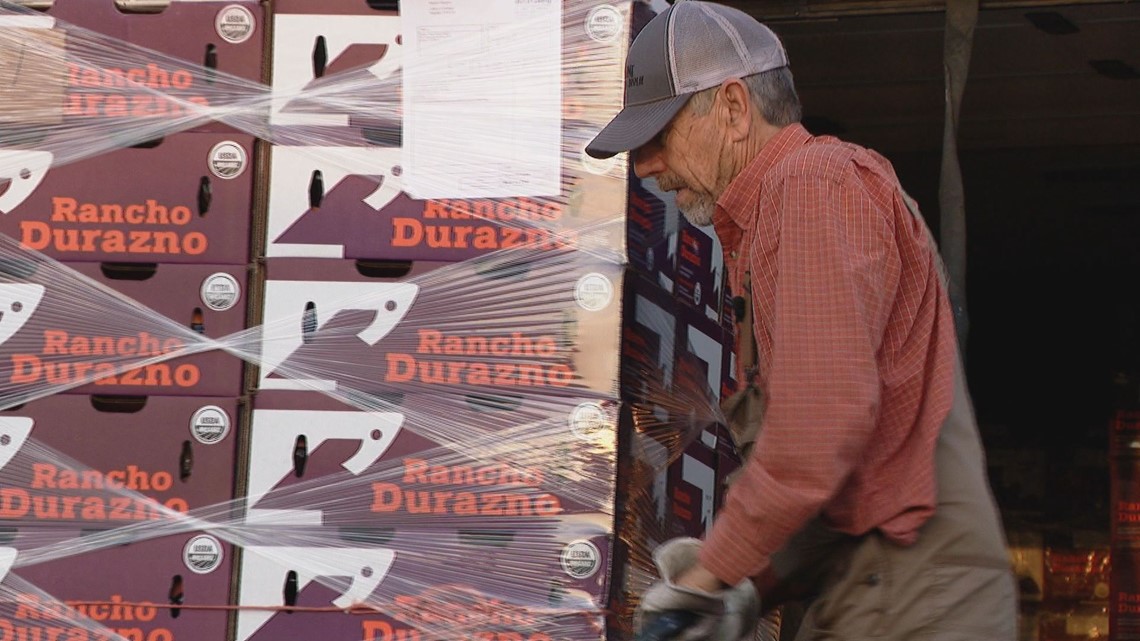
So it’s only natural he would make sure the place landed in good hands. Those hands belong to his youngest daughter, Gwen Cameron.
“Feels to me like my lifetime achievement award,” Thomas said, standing next to Gwen on a chilly morning. “A life that I chose for myself that anybody else would want to follow and do the same this is, like, OK, that validates what I’ve done.”
Gwen responded, without missing a beat, “You made it look pretty good.”
At a time when family farms are rare, this one is moving onto the second generation.
“To be able to take over his life’s work is a pretty incredible opportunity,” Gwen said. “Here is 50 years of knowledge and experience – now it’s your turn.”

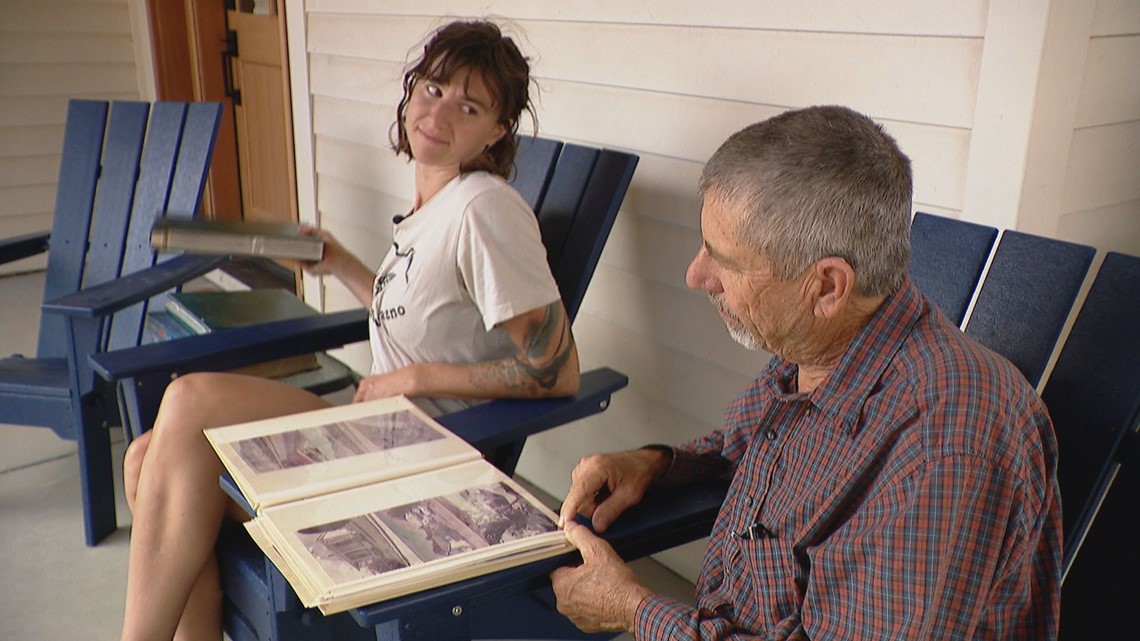
Chapter 2 A farmer is born
“It did not occur to me as something I could do,” Gwen said, reflecting on her journey back to the farm.
Gwen grew up in Palisade. She climbed the rocks around the farm with her sisters, and they explored nearby canyons. Their mom and dad encouraged exploration.
“I think my childhood is the type that doesn’t exist for a lot of people anymore,” Gwen said. “It was going out in these canyons for hours and hours and my parents not really knowing where I was. It was catching lizards, it was swimming [in] the irrigation ditch.”

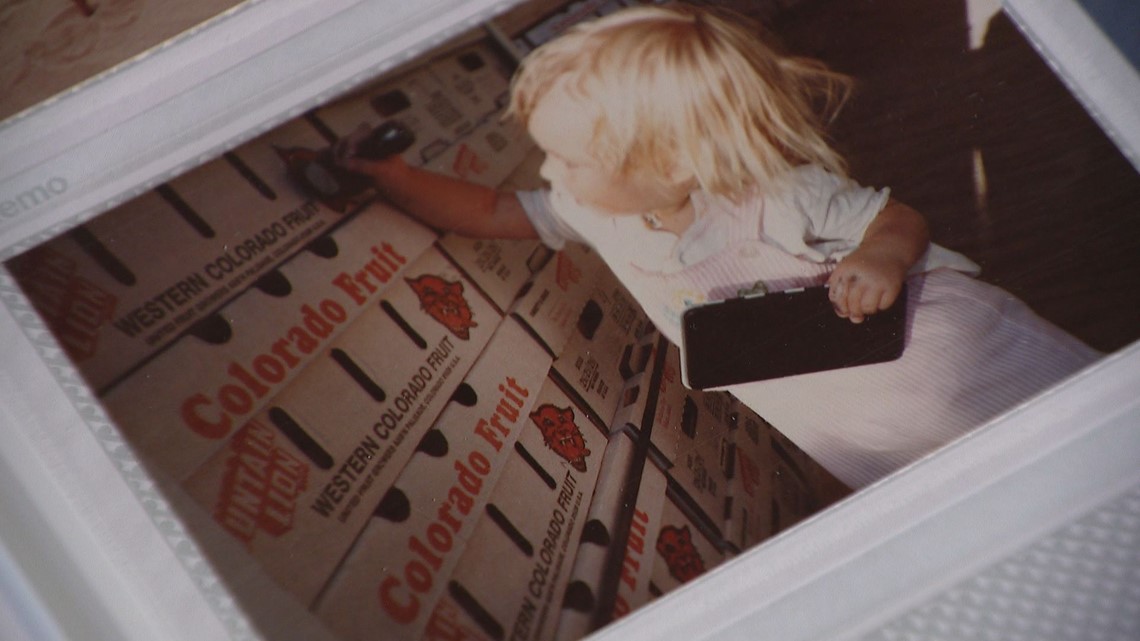
She also saw the tough stuff that comes with farming. Her dad worked a lot in the summer.
“What I did see was the stress and anxiety involved in farming,” she said. “I saw him working seven days a week. I saw that he has to tighten his belt loop a little in the summer because he doesn’t have time to eat.”
Like a lot of farm kids, Gwen left. She went to the University of Colorado Boulder, got a degree in journalism and moved to Vermont to edit for a magazine. When Thomas started talking about retirement, Gwen listened. Her roots in Palisade were stronger than the words she was editing.
“I said yes, but give me 10 years to try this journalism thing out and then yes, I’m in,” Gwen said. “That was in 2010, and then I think he got more antsy to retire, and then he approached me in 2015. I came back sooner than I thought, and I’m so happy I did.”
Gwen has been back eight springs – plenty of time to understand the stress of the season, see frost ravage pretty pink blossoms, tighten her own belt when she forgets lunch.
Plenty of time to also feel grateful to have her dad’s help — even in retirement. They talk about farming a lot and often meet several times a day during the busy summer months.
“I’m able to use the relationships he’s built and the knowledge that he’s gained from doing this for decades, so I have it easier,” Gwen said. “His knowledge is really valuable and not something every farmer is able to pull from.”

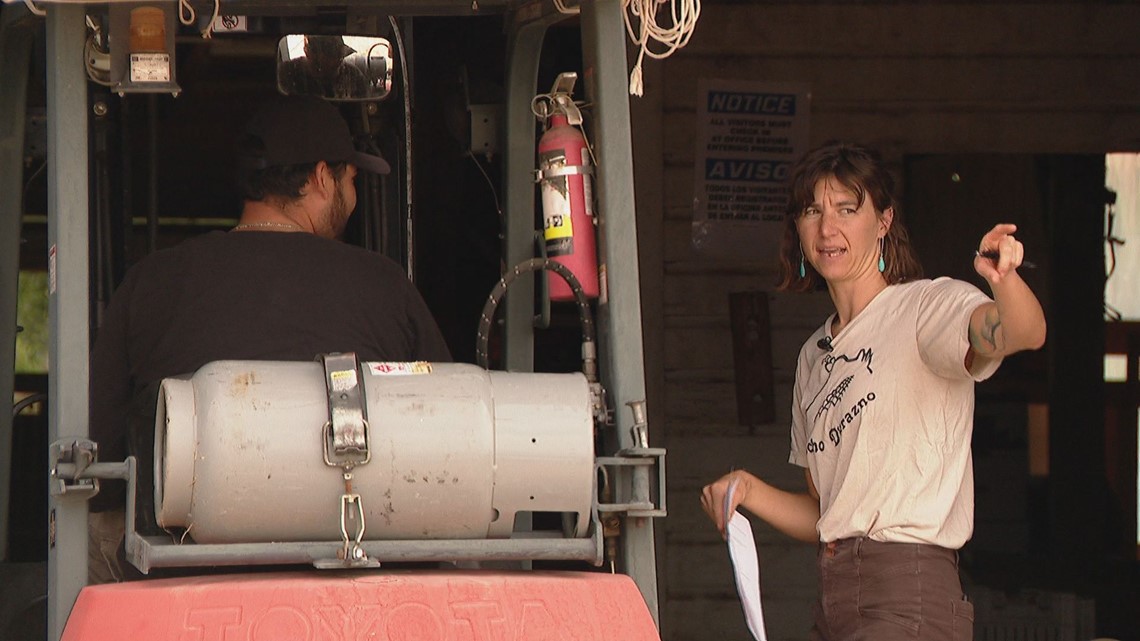
Thomas never pressured his daughters to work on the farm when they were young. He credited Gwen’s return to that philosophy he adopted early on.
“If they wanted to come along, fine, or they could go back to the house and play with their friends,” Thomas said. “Not making them do something they didn’t want to do, but keeping the door open.”
He’s proud that Gwen walked back through that door, though he’s not totally surprised.
“She liked working with the crew out in the field when she was 13,” Thomas said. “I think that’s when she really started becoming a farmer.”
Gwen said this time learning from her dad has been beneficial. She said he’s a knowledgeable and accepting mentor – something she doesn’t always experience out in the farming world because of her gender.
“There’s a lot of running to the hardware store, things like that, and it’s definitely assumed that I don’t know what I’m doing, and that I’m not the owner of the business,” Gwen said. “That’s kind of a given when I walk in the door. A man my age with two weeks of experience would get a very different reception.”
This frustrates her, but she uses these interactions as a learning tool.
“I kind of relish the opportunity to educate them and to change their worldview a little bit,” Gwen said.
From blossom to market on a Palisade peach farm
Chapter 3 A changing climate

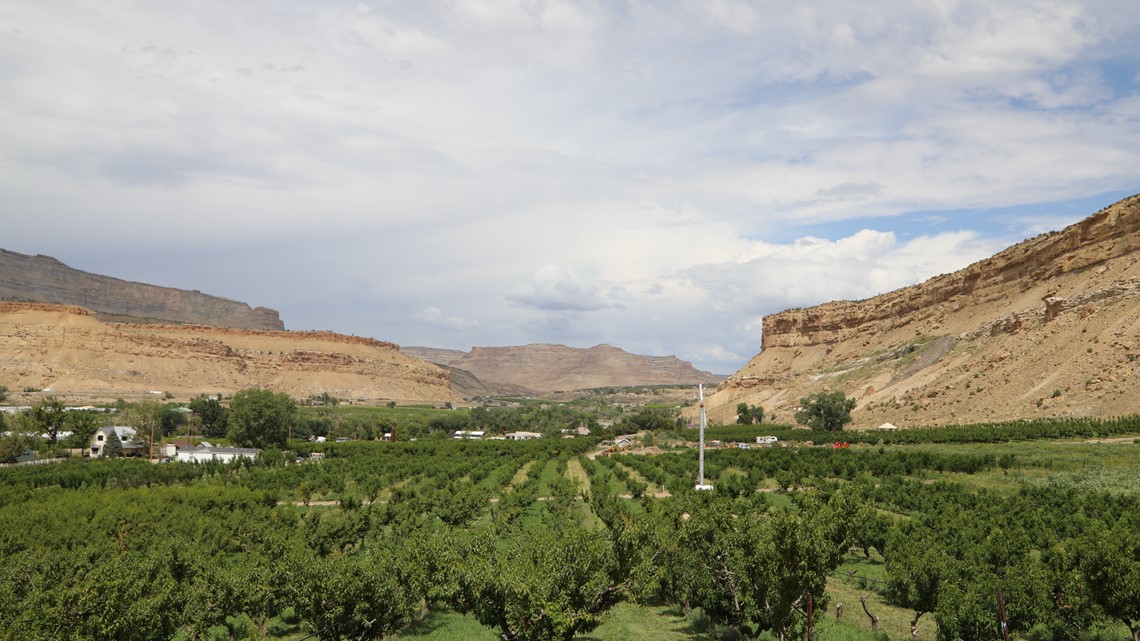
Spring is a stressful time for farmers on the Western Slope, but this past spring didn’t bring many nights below freezing. As Rancho Durazno creeps toward summer and leaves replace blossoms, there’s another problem to worry about.
“You stop worrying about frost, and you start worrying about hail,” Gwen said, laughing and cringing at the same time.
Gwen walks through a row of peach trees with golf ball-sized green peaches growing on branches. She said hot days followed by cool nights is what makes Palisade peaches special.
Climate makes this fruit different. So climate change is always on Gwen and Thomas’ minds.
“The data is pretty clear that people are the cause of climate change, and it’s happening,” Gwen said. “It’s hard to ignore when you’re a farmer and you’re paying such close attention to the weather, to the health of the trees, to the availability of water.”
Thomas and Gwen talk about it often.
“The continuation of this drought that’s 22 years old,” Thomas said. “It could become this very small niche thing happening here to grow fruit at all. It’s hard to really paint a picture of the uncertainty. Maybe I don’t indulge my darkest thoughts.”

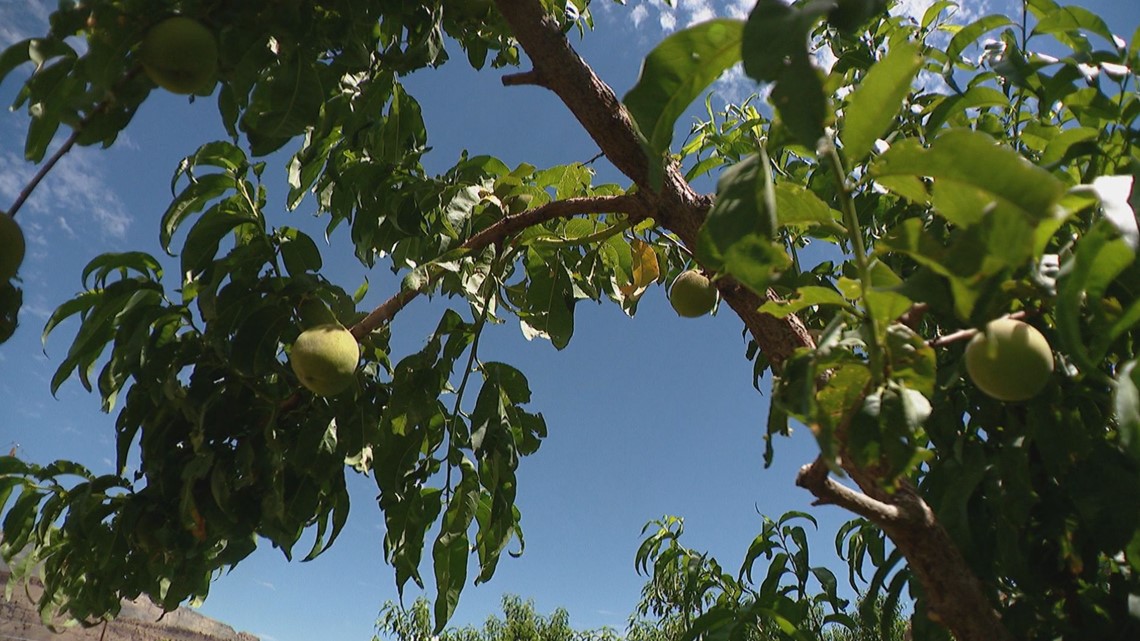
The father and daughter consider themselves stewards of the land. Gwen said she’s committed, like her dad, to improving the soil and the ecosystem and to keeping the farm organic.
“It would be a lot easier if I could take some harsh chemical and spray it, and all the bugs are dead and all the peaches are perfect, but it’s important to me to make as little negative impact on the land as I possibly can, and on the people who eat our fruit,” Gwen said.
Most of the years that Rancho Durazno has been producing fruit, it’s been organic. Thomas made that a priority early on.
“We’ve got to treat everything as a whole, not just our own little piece,” Thomas said. “I don’t know how you can be in agriculture without being an environmentalist.”
This year, the farm replanted thousands of trees. Some of them were up for regular replacement — peach trees have a lifespan. Other trees were replanted earlier than Gwen would like.

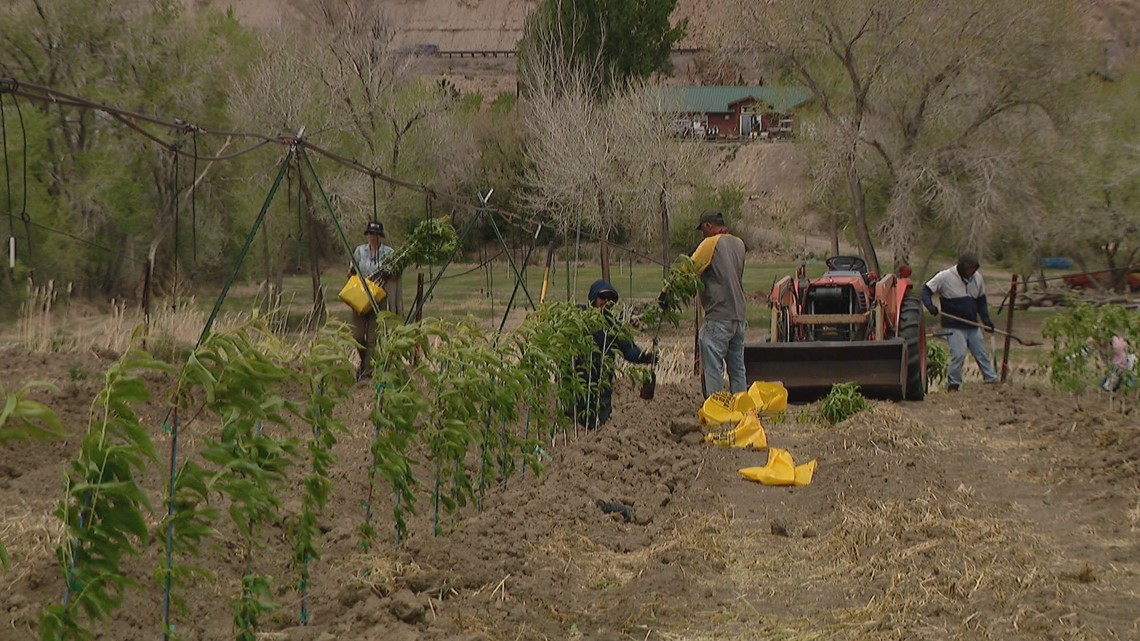
“In the fall of 2020, which is a really unusual time for a freeze — we’re used to freezes in the springtime that can damage the crop — but a fall freeze of that magnitude is really unusual,” she said. “We lost about 3,000 trees, and with the remaining trees, about 50% of those were damaged.
“I definitely have climate change on my mind a lot with weather events like that,” she said. “That’s not normal for it to go from a warm, 70-degree day and suddenly it’s down to 16 degrees in Palisade.”
The crop was much smaller that year, but a typical year for Rancho Durazno yields about 250,000 pounds of peaches. On a frost-free, good year, about 30 million pounds of peaches come out of Colorado – most of them from Palisade. The sales of these peaches both in and out of state results in tens of millions of dollars being pumped into Colorado’s economy.
It’s a part of the economy and part of what Colorado residents look forward to in summer.
“To work your butt off all year and to stress and to lose sleep over it and at the end have a thing that you hold in your hands and say, ‘Here, this is what I’ve been doing. This is for you,’ ” Gwen said.
> Video below: It's peach-picking season in Palisade:
Chapter 4 'They're our people'

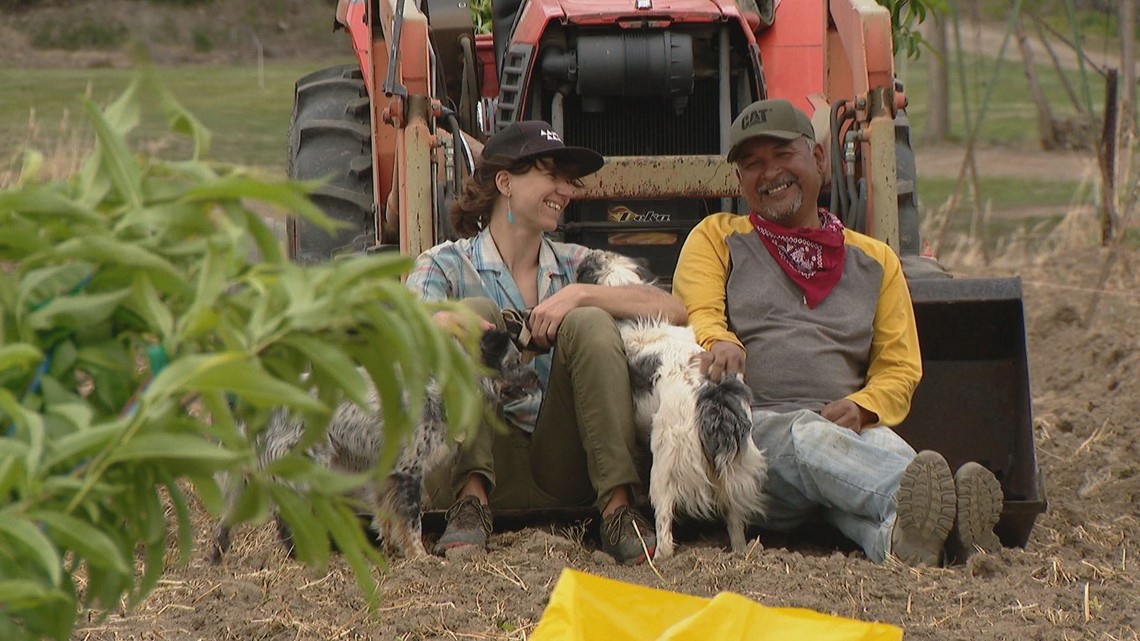
Gwen’s 40-acre farm has 15,000 trees. During peach harvest, the orchard hums with pop music, tractor noise and the sound of Gwen’s employees picking peaches, telling jokes and catching up in Spanish.
Without help, peaches don’t get picked and sold, and Rancho Durazno isn’t a farm. And much of Gwen’s help is in Palisade on H-2A Visas for agricultural workers.
“I wish people knew how hard the work is,” Gwen said. “I wish people knew that our crew that comes up from Mexico leaves their family for 10 out of the 12 months of the year to come and do this work. The people who come up are a part of the farming system here and a part of what makes any farm functional.
“We would not be the same without them.”
Gwen leans on the culture her dad built with the people who worked for him. Thomas and Gwen both know Spanish, and they have formed close bonds with their employees.
“There’s always been immigrants who come to the U.S. that don’t have more than suitcases they’re carrying and want to work hard and be part of culture and society,” Thomas said. “These people have the exact same motivations, the same values and same cares as everyone else here.”
Adolfo Yevismea Jupa has been coming to Rancho Durazno from el Paredoncito in Mexico for 14 years. He’s spent time in Thomas’ home, and Thomas has visited him in Mexico. He even attended Adolfo’s daughter’s wedding.
> In his own words: Meet Adolfo Yevismea Jupa:
“I took him fishing,” Adolfo said. “It was interesting because seeing how he was smiling when we went fishing on the boat, and he would start to laugh, and I told him, ‘Why are you laughing? 'I'm excited,' he said, 'because it's so pretty,' he said.’ ”
They treat one another like family. Gwen knows Adolfo’s favorite movie is “Forrest Gump” — a movie he’s watched hundreds of times. She speculates it’s because it’s about an adventurous underdog.
Family is why Adolfo returns to Rancho Durazno year after year.
“It is very difficult, but it is also nice to achieve things,” Adolfo said. “For example, my two daughters are teachers, and to pursue an education is sometimes difficult in Mexico. There is not much work, and thanks to this, my daughters have studied.
“And we have a good, well not good life, but better, thanks to this.”

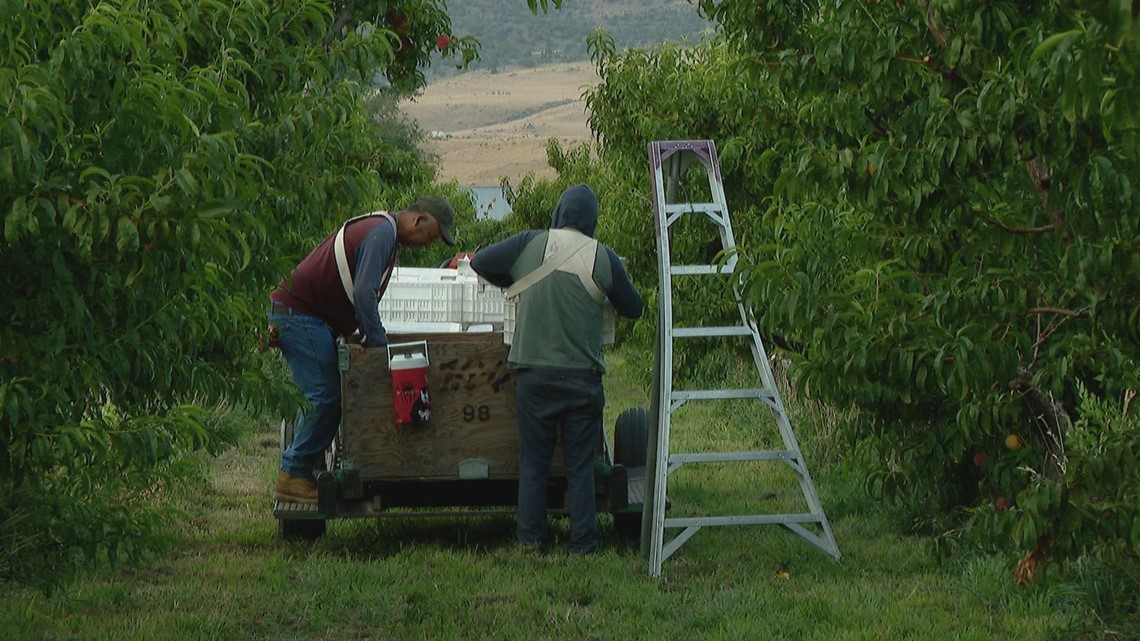
Luis Angel Guzman zips around the shed where peaches are sorted and packed on a forklift. He is Adolfo’s son-in-law, and spends much of his time at Rancho Durazno supervising the packing shed. He said he likes working on the farm, and that he’s enjoyed learning about what goes into peach farming.
As much as he enjoys the work, he misses his family back in Obregon, which is in the Mexican state of Sonora. For much of the year, he leaves his wife, who is a preschool director, and an eight-year-old son, Luis Esteban.
“It is difficult to come here, to leave family, very difficult, but I also think of being able to help them,” Luis said. “It is sad to leave them, difficult, but I’m eager to help them have a little better life.
When he heads home late October, he thinks of doing only one thing when he gets back.
“Mainly be with my family and going to the beach, to various places to distract ourselves from work, and to spend time with the family,” Luis said. “Being with them is the most favorite thing for me – being with them is the best.”
> In his own words: Meet Luis Angel Guzman:
Adolfo and Luis are in the United States on H-2A visas. Rancho Durazno applied for six worker’s visas in 2022, and the people who help are all, in some way, related to Adolfo. He said the family atmosphere, plus having Thomas and Gwen as bosses, makes the work a little easier.
“The first time I arrived here, from that moment on, I fell in love with this ranch,” Adolfo said, as he took a break and leaned on a tractor that he expertly pilots around the land he knows so well. “I have not worked anywhere else in the United States other than here on this ranch.”
Area farms applied for nearly 400 H-2A visas in 2022. Gwen knows her farm would not survive without the help. She also knows it wouldn’t be the same.
“That’s why we have the farm name that we do, is that my dad saw that it’s those migrant laborers that are doing the majority of the hard work of farming, and he wanted to give them credit for that,” Gwen said. “That’s why he chose the name Rancho Durazno – to kind of lift that up and honor it.”
Rancho Durazno simply means “Peach Farm” in Spanish.
“There’s farmers who hire Spanish-speaking people who do work in their orchards, and they don’t know what my farm name is. ‘Oh that means peach farm? Durazno means peach?’ ” Thomas joked.

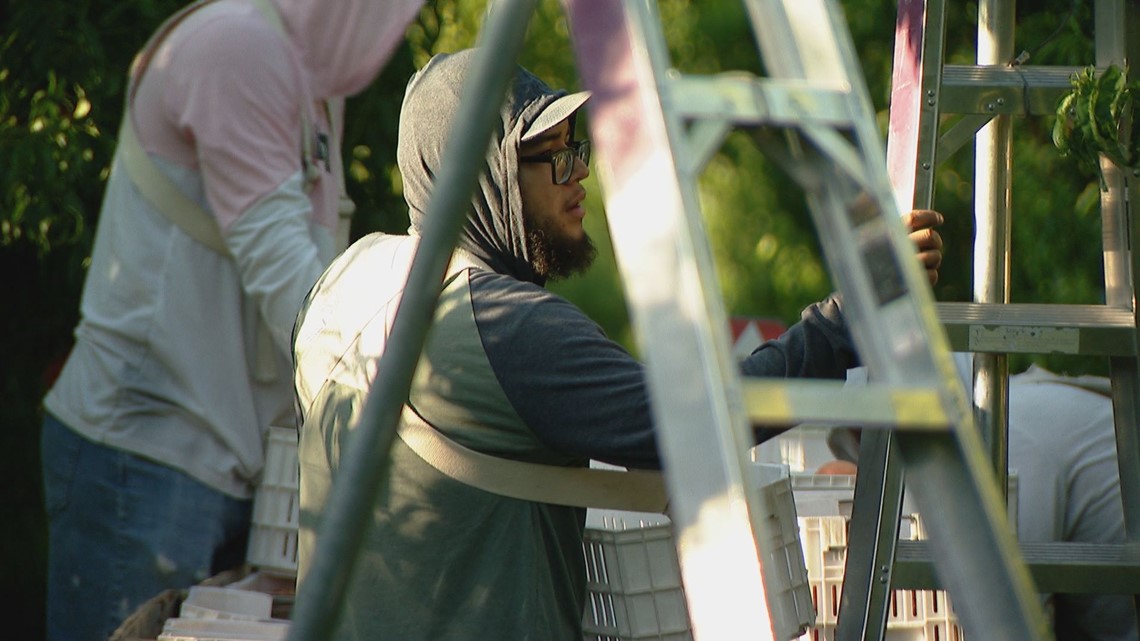
The respect is mutual. Jonathan Navidad is Adolfo’s nephew. He became a U.S. citizen in 2015 and has spent the past two years working at Rancho Durazno. This summer, he learned how to pick peaches from his expert uncle. Gwen and Thomas are good bosses, he said.
“For me, they’re like family,” Jonathan said while picking peaches early one summer morning. “They’re not like the bosses or anything, they’re like family for us.”
To make money, every viable peach must be picked and sold. Without these workers, that wouldn’t happen.
“We have to advertise that job in multiple places, and if a person has a month of experience on a farm and is able to carry 40 pounds, we have to hire him,” Gwen said. “The number of phone calls I’ve gotten in the U.S. asking about this job is zero in the last two years.”
> Video below: Adolfo and Luis talk about the end of the season:
Chapter 5 Summer and Beyond

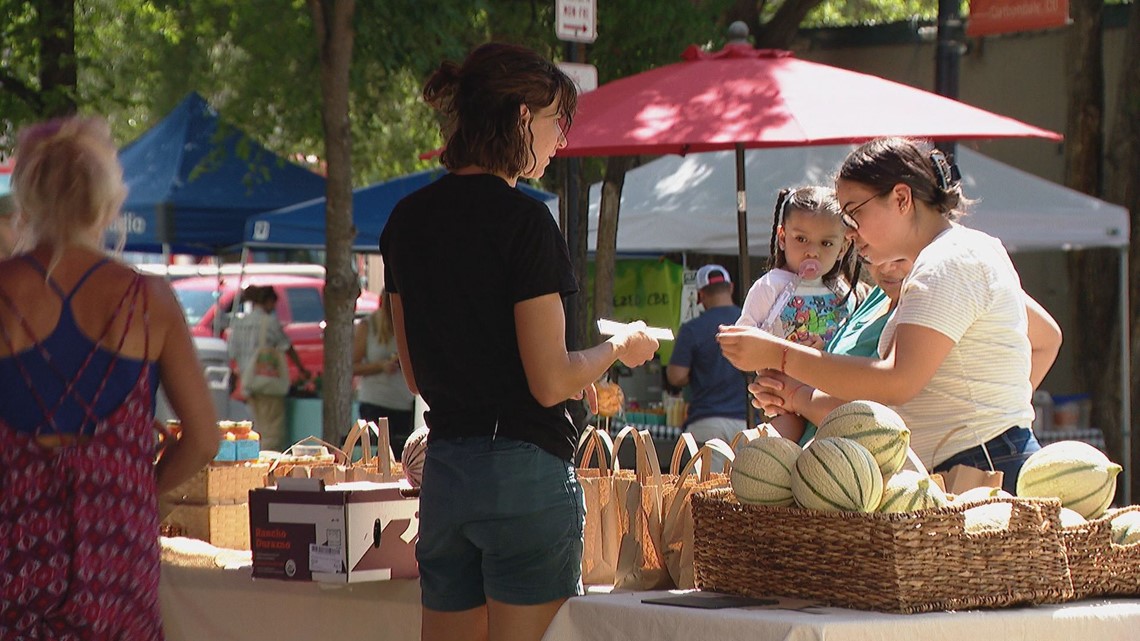
Farmer’s markets start to pop up across Colorado in summer, and Palisade peaches are the star once they start coming off trees. Gwen’s farm is a regular at five or six markets. She tries to take time out every week to work at her favorite one, the Carbondale Farmer’ Market.
“I try and do one, so I’m having that experience of interacting with customers and getting good feedback on the fruit,” she said while cutting up melon samples.
She said about 25% of what Rancho Durazno makes comes from these markets. People start lining up early to get their peach fix.
“I’m actually here because I ate the last peach and my 7-year-old son freaked out, so I have to restock,” said Sarah Kuhn, who bought a bag of peaches from Gwen’s farm.
Most of the markets that feature Rancho Durazno’s fruit are on Colorado’s Front Range, a few hundred miles from the farm. For about six weeks, Thomas happily jumps in the farm’s truck and makes the trip.
Deliveries start before dawn.
“It’s fun for a few weeks – for a few weeks,” said Thomas, trying to convince himself that he likes the back-and-forth across the state, including the 4 a.m. wakeup calls.
The Fort Collins, Longmont and Boulder farmers markets are successful for Rancho Durazno. Even with gas prices higher than they’ve seen in years, Gwen and Thomas keep trucking back and forth between home and the Front Range.
“The farmers market and selling directly to customers is really what sustains us,” Thomas said. “When I deliver direct to customers they’re like, ‘Oh, you’re here! The peaches are here! Thank you for doing this!’ ” Thomas said. “OK, I guess I’ve got to keep doing this.”

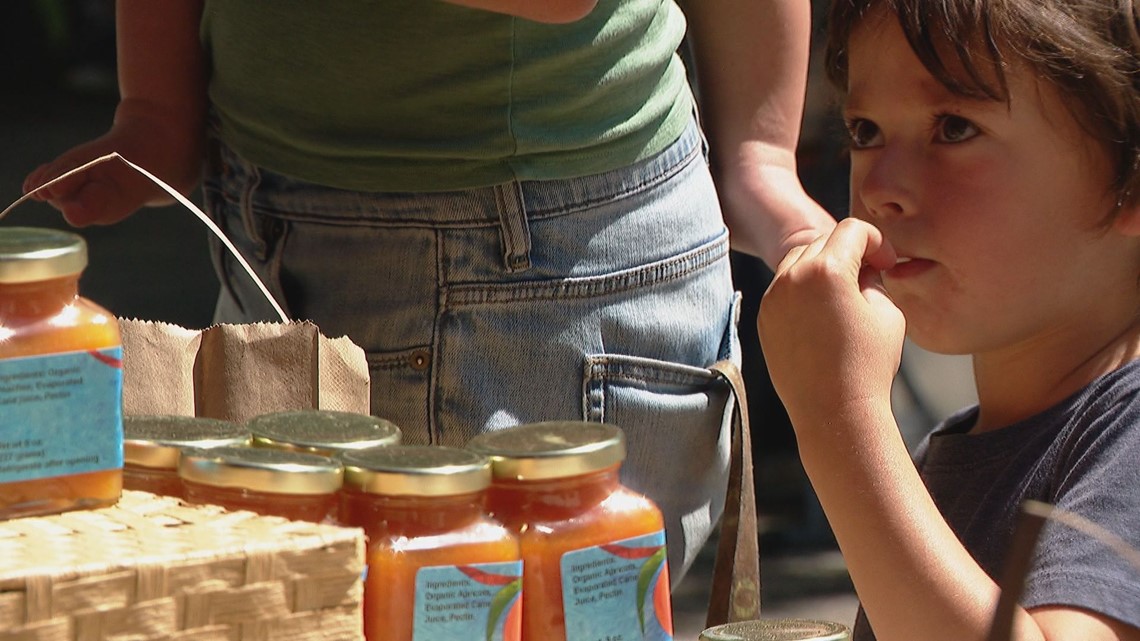
In Carbondale on a hot Wednesday, Gwen all but sells out of peaches by 11:30 a.m. Her stand has been open less than two hours. Only a few small bags of fruit remain.
“We sold out, we’ll have more next week,” Gwen told a disappointed customer.
With only a few weeks left in the peach season, Gwen can start thinking about something besides farmwork. Summertime contains zero lazy days, so she’s looking forward to what’s next.
“I will be heading to Mexico to visit my crew in their hometown, which will be great, I haven’t done that,” Gwen said, while taking a breather between customers at the Carbondale market. “My dad has been a couple of times, but I’ve never visited — I’m excited for that.”
Chapter 6 A new season

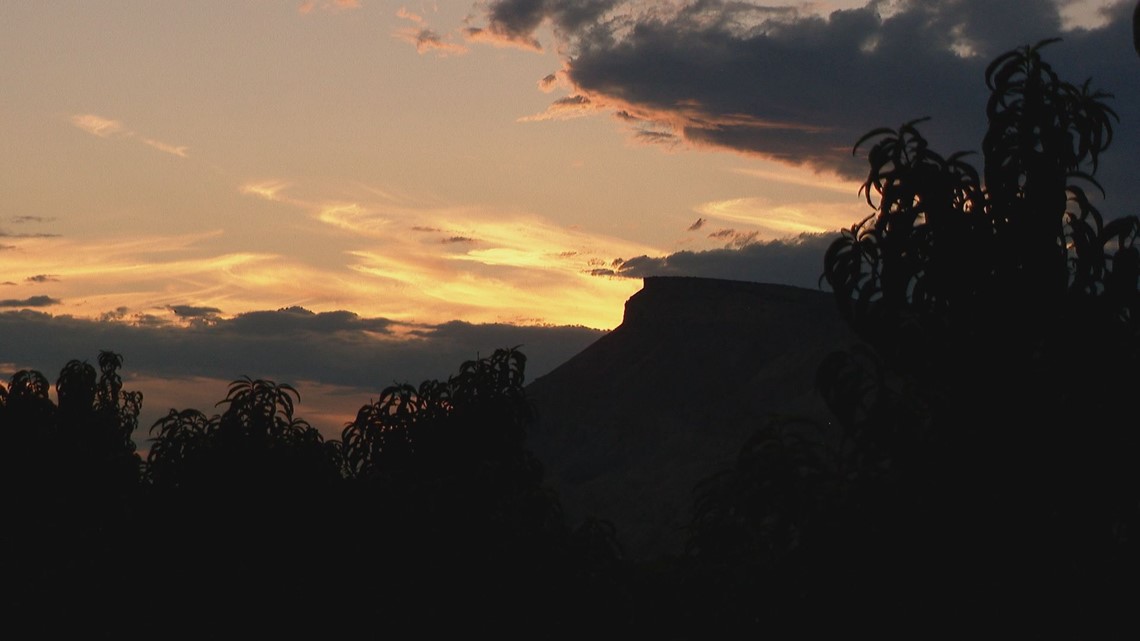
A good farmer knows the land.
A good boss treats employees like family.
A good dad knows how to let go.
“It’s fun to just let it happen,” Thomas said. “That’s the way I’ve been with kids. I’m not going to shape who they become, I’m just going to enjoy how they blossom and become themselves.”
His youngest daughter appreciates his parenting style.
“He is kind and supportive and very empathetic, but he also really likes to foster independence,” Gwen said.
Gwen is surprised to find herself back in the place she grew up. It’s a good kind of surprise, though. She said she’s happy to have found what she’s meant to do. It was hidden in plain sight among the familiar rock formations and canyons of her childhood.
“When I look around, what I see is my dad’s life work, and I get to take that and continue with it and make it my own,” Gwen said. “And that’s a pretty incredible gift.”
RELATED: A fungus reduces the lifespan of Palisade's famous peach trees – CSU researchers aim to stop it
SUGGESTED VIDEOS: Feature stories


